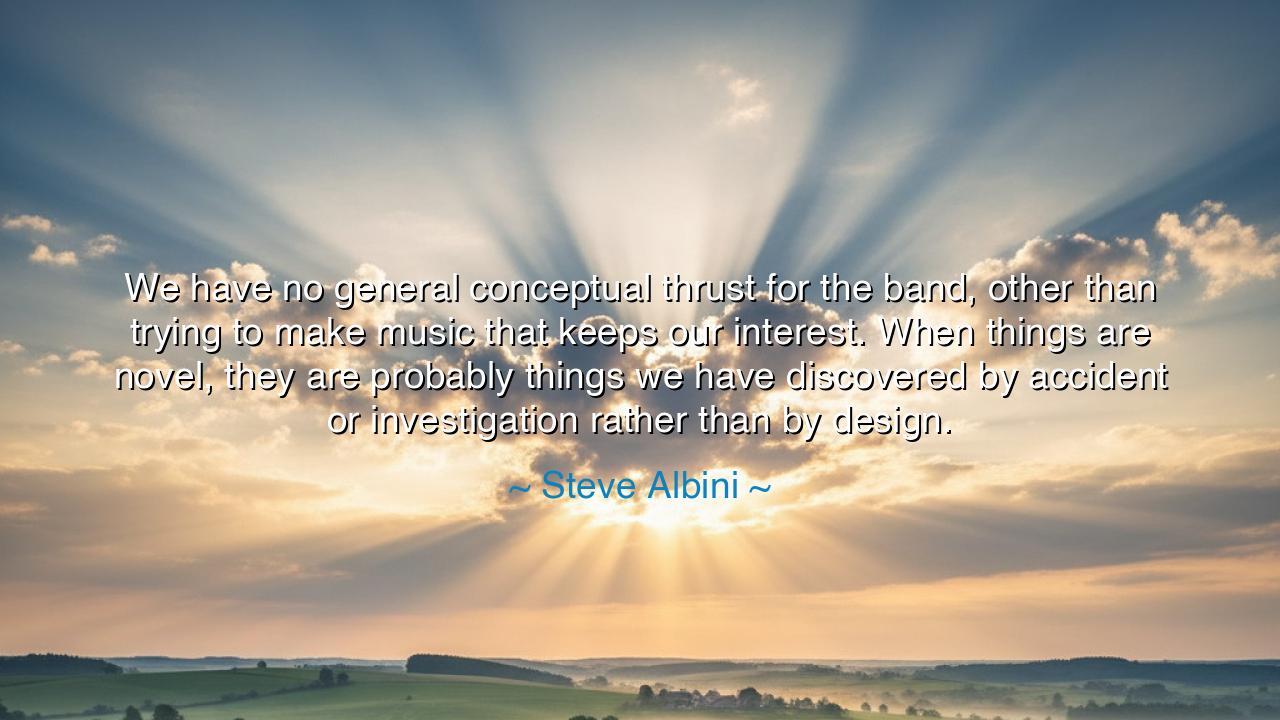
We have no general conceptual thrust for the band, other than
We have no general conceptual thrust for the band, other than trying to make music that keeps our interest. When things are novel, they are probably things we have discovered by accident or investigation rather than by design.






“We have no general conceptual thrust for the band, other than trying to make music that keeps our interest. When things are novel, they are probably things we have discovered by accident or investigation rather than by design.” Thus spoke Steve Albini, a craftsman of sound, an architect of noise, and a philosopher of creation disguised as a musician. His words carry the humble but powerful truth that lies at the heart of all authentic artistry: that creation is not always born from control, but from curiosity. The truest beauty in art often arises not from plan or structure, but from discovery, from the wild and unpredictable dance between intention and chance.
In the age of the ancients, artists and thinkers alike recognized this paradox. The sculptor who carved the marble did not always know what form lay within it—he revealed it little by little, guided by instinct and the stone’s own will. The philosopher Heraclitus once wrote that the way to wisdom was not through maps but through exploration, for “you cannot step into the same river twice.” So too does Albini remind us that art is a living process, not a static design. To “have no conceptual thrust,” as he says, is not to lack direction—it is to travel the road of creation with openness, to allow accident and investigation to guide one toward truths the conscious mind could never have designed.
Albini’s approach to music—raw, honest, and unpretentious—stands as a rebuke to the vanity that often clouds the creative spirit. Many seek to craft masterpieces through design, calculating how to impress or succeed. But Albini and his band, Shellac, find joy in discovery. Their art is not built to please the world, but to keep their own interest alive, to remain true to that inner spark that first called them to sound. This is a profound teaching: that the artist’s first responsibility is not to fashion perfection, but to remain in love with the act of creation itself. For once that love is lost, the art dies, no matter how polished the result.
Consider the story of Alexander Fleming, the scientist who discovered penicillin. His breakthrough, one of the greatest in human history, was born not of design but of accident. A mold grew in one of his neglected Petri dishes, and instead of discarding it, Fleming observed. His curiosity transformed mistake into miracle, and from that moment, millions of lives were saved. In Fleming’s humility before the unknown, we see Albini’s spirit reflected: the willingness to let chance reveal new truths. For discovery belongs not to the proud, but to the attentive—those who listen when the universe whispers.
Albini’s words also remind us that novelty, true novelty, cannot be forced. The human mind, when constrained by too much planning, repeats itself. Innovation blooms only in freedom. To investigate rather than dictate, to stumble upon rather than script—this is the path of the artist who honors the unpredictable muse. The ancients called this state divine madness, the sacred inspiration that descends when the mind surrenders control. It is what the Greeks saw in the poet, what the Zen masters sought in the brushstroke—spontaneity guided by awareness. Albini’s music is born of this same ancient impulse: to be present with the process, to let the work become what it must, rather than what the ego demands.
And there lies the deeper wisdom: that life itself is much like Albini’s art. We move through it without a general conceptual thrust—no perfect plan, no grand design fully known to us. We investigate, we experiment, we stumble into wonder or sorrow, and through it all, we discover what it means to be human. Our greatest insights come not from our designs, but from the accidents that reveal who we are. The wise learn to welcome the unexpected, to treat each surprise not as a disruption, but as a teacher.
So let this be your lesson: do not fear the lack of a plan. Whether you are an artist, a thinker, or a builder of dreams, let your curiosity be your compass. Seek not control, but clarity; seek not perfection, but participation. Follow your interest, your fascination, your living spark. For creation that arises from genuine wonder will always be alive, while that which is overdesigned will soon wither into lifelessness.
As Steve Albini teaches through his humble philosophy, great art—and great life—is born not from design, but from discovery. To create is to explore; to explore is to surrender; and to surrender is to find the unexpected path toward truth. Keep your heart open to accident, your hands ready for experiment, and your spirit awake to surprise. For in the end, all true creation—like music itself—is not constructed, but found.






AAdministratorAdministrator
Welcome, honored guests. Please leave a comment, we will respond soon